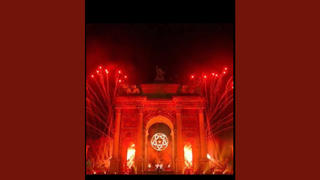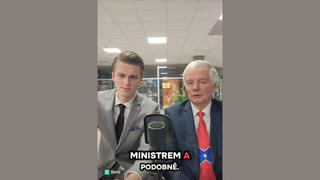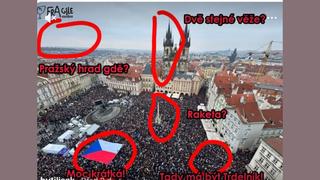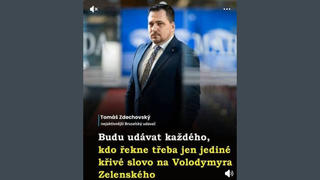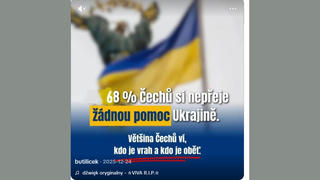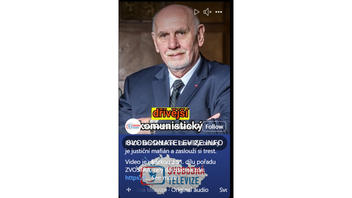
Did the Czech Constitutional Court cancel the early elections in 2009 because its president at the time, Pavel Rychetsky, did not like the parties that would likely win according to pre-election polls? No, that's not true: The Constitutional Court upheld a complaint of one of the then-lawmakers against the constitutionality of the early dissolution of the parliament. The court ruled that the process was unconstitutional and cancelled the early elections. The decision had nothing to do with the alleged political views of any judge.
The claim appeared in a video published on TikTok on March 21, 2025, no longer available on the platform but archived here. (The same video can also be seen on Facebook here, archived here.) It opened:
(Pavel Rychetsky) made the Constitutional Court his private activist institution and in 2009 even banned democratic elections. At that time, the parliamentary elections were to be held and according to the polls, other parties than the ones Rychetsky would have wanted were to win and because of that he and his mafia from the Constitutional Court banned the elections...
This is what the post looked like on TikTok at the time of writing:
(Source: TikTok screenshot taken on Thu Apr 10 08:27:03 2025 UTC)
Pavel Rychetsky was the former President of the Constitutional Court, serving from 2003 to 2023 (archived here). In 2009, he presided over the court that took a groundbreaking decision (archived here) to cancel early elections just a month before the scheduled date, which upset several politicians (see screenshot below) as election campaigns were already underway. The then-Czech President Vaclav Klaus even said that the court´s rights should have been redefined (see screenshot below).
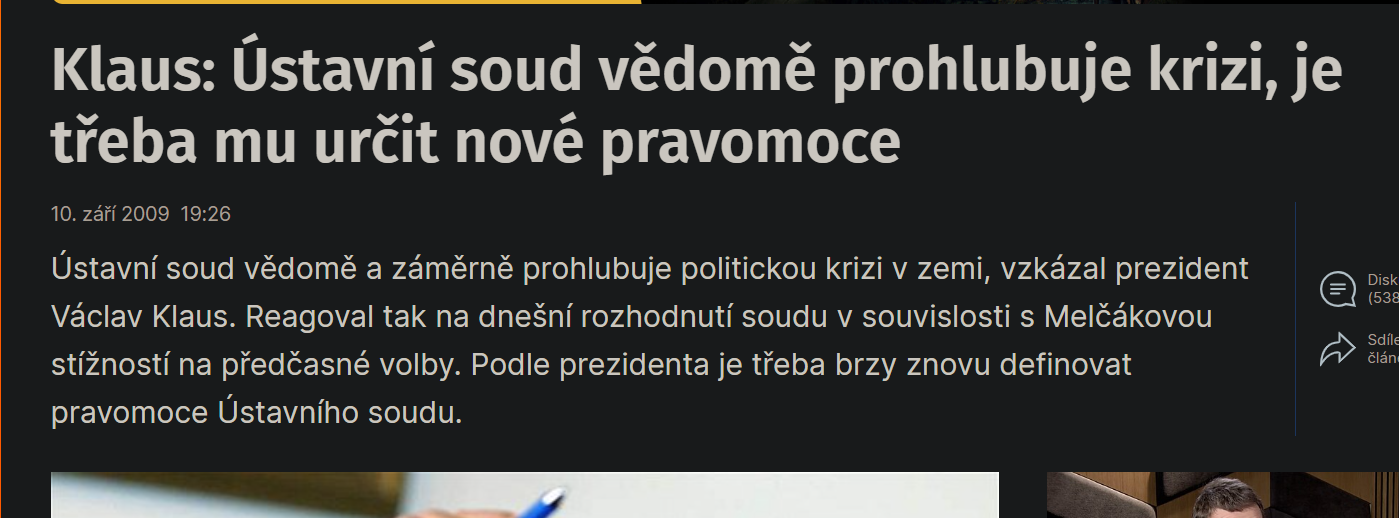
(Source: iDnes.cz screenshot taken on Fri Apr 11 08:27:03 2025 UTC)
However, there is no evidence that Rychetsky canceled the early elections because of his alleged political views. Several judges were involved in the decision, not just Rychetsky, and they voted 13 to 2 to cancel the early vote in 2009. Even the two judges who dissented did not mention any colleagues´ political preferences playing a part in their reasoning, which is documented in the published judgment (archived here).
Additionally, there are rules (archived here) in place to prevent situations where judges may be biased towards specific political parties. For example, judges cannot be affiliated with political parties or movements. The institution is apolitical, and its primary task is to protect the constitutionality, fundamental rights, and freedoms deriving from the Constitution and guarantee the constitutionality of the exercise of state power.
The above TikTok video is part of a trend of attacks on the Czech Constitutional Court. Its role and representatives have recently been the target of misinformation on social media linked to the upcoming 2025 Czech parliamentary elections (archived here). Such attacks are also connected to the case in Romania, where the Romanian Constitutional Court annulled the presidential elections scheduled for 2024.
Lead Stories has debunked such attacks on those institutions here and here.
In September 2009, the Czech Constitutional Court canceled the early elections (archived here). It upheld a complaint filed by one of the lawmakers at the time, Milos Melčák (see screenshot below). Melčák claimed that early elections breached his constitutional right to serve his mandate in full and that the elections were organised in breach of the Constitution.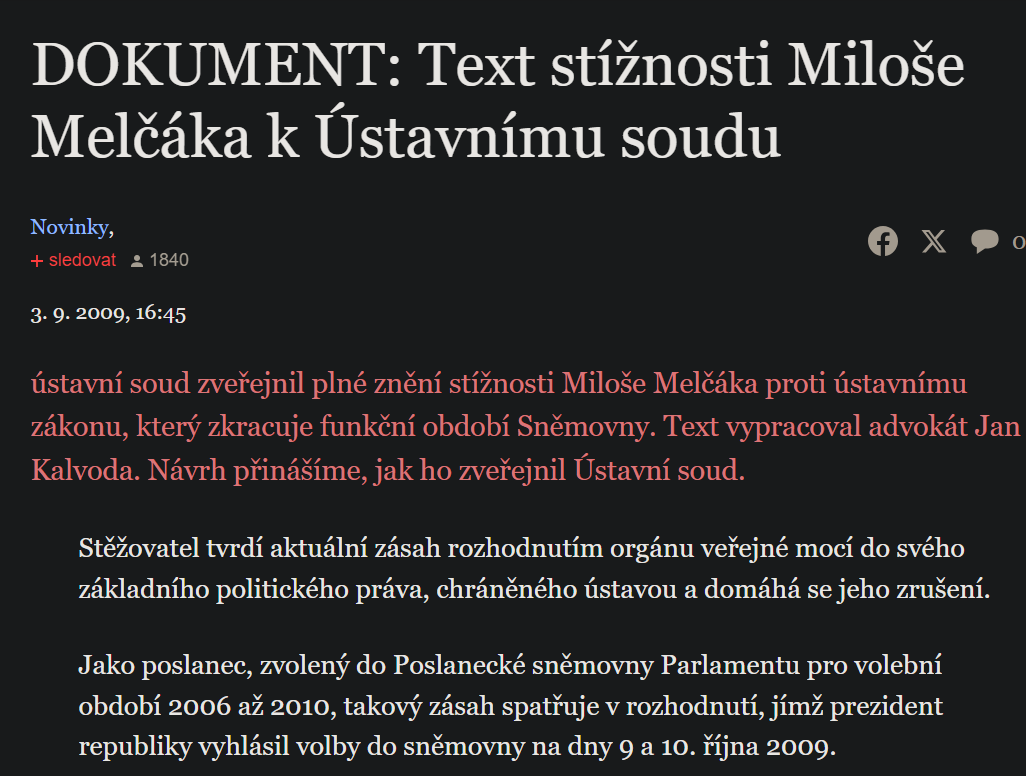
(Source: Novinky.cz screenshot taken on Fri Apr 11 10:27:03 2025 UTC)
In its judgment (archived here) dated September 10, 2009, the court said that the constitutional amendment, adopted earlier by the parliament to shorten the term of the then-Chamber of Deputies to allow the early poll, was itself a breach of the Constitution. It "violated" what the judges called the "material core" of the Constitution. The court upheld Melčák's complaint 13-2 and cancelled the October date for early elections.
Two judges, Musil and Kurka, in the minority, argued that the court should refrain from deciding because it had had only a few weeks to assess the complaint, apart from other issues. Their arguments are listed in the judgment linked above, and they do not include any mention of the alleged political preferences of any of the judges as reasons for their disagreement with the decision.
A few days before the ruling was announced, Rychetsky explained to the press (archived here) that he saw it necessary for the public interest that the court ensure the early vote was in line with the constitutional order. "So that it does not happen that people are then told that it is not valid" and state means are wasted, Rychetsky said.
After the court´s decision, the elections were held later in a regular term in May 2010 (archived here).
A Google search (see screenshot below) for the Czech phrase "Rychetský zrušil volby v roce 2009, protože se mu nelíbilo, jaké strany by vyhrály," translated by Lead Stories staff as "Rychetsky canceled the election in 2009 because he did not like what parties would win," carried out on April 11, 2025, brought no relevant results. It also showed no evidence to substantiate the claim made in the TikTok video.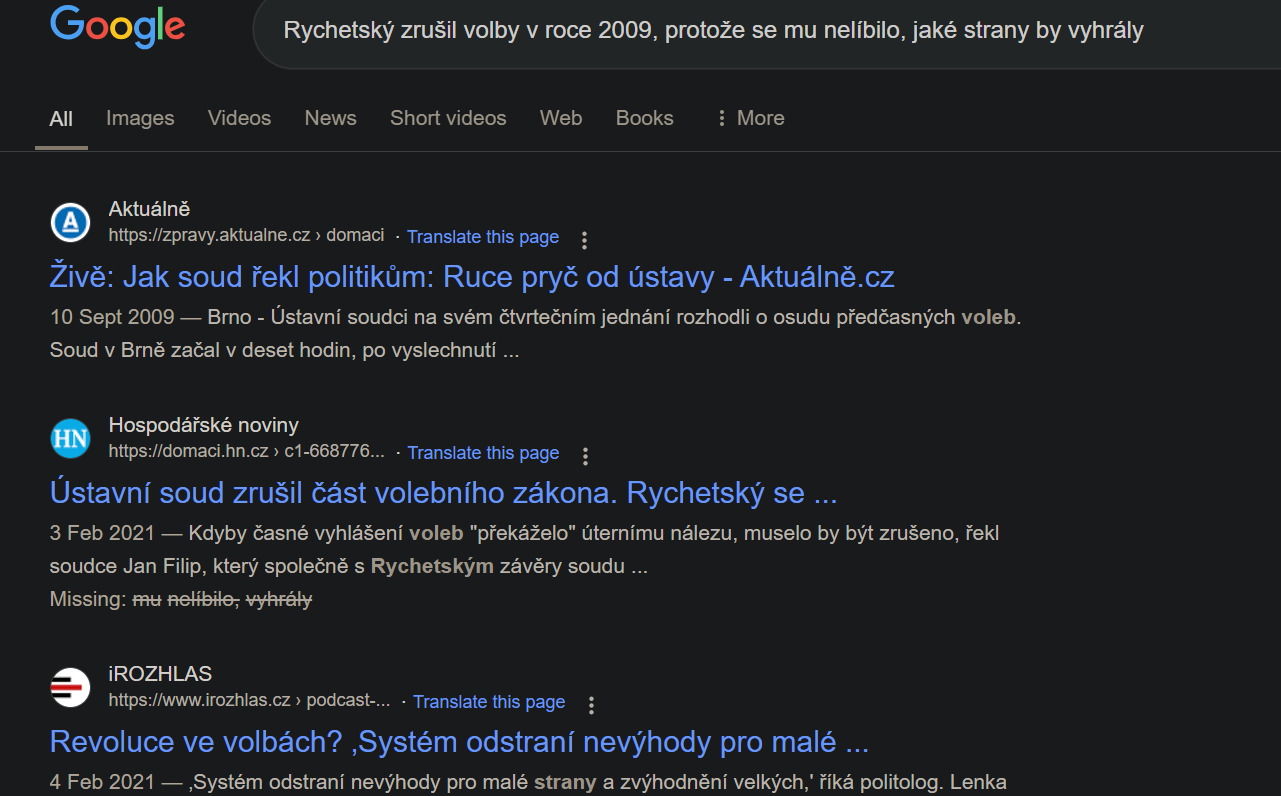
(Source: Google screenshot taken on Fri Apr 11 09:56:03 2025 UTC)



